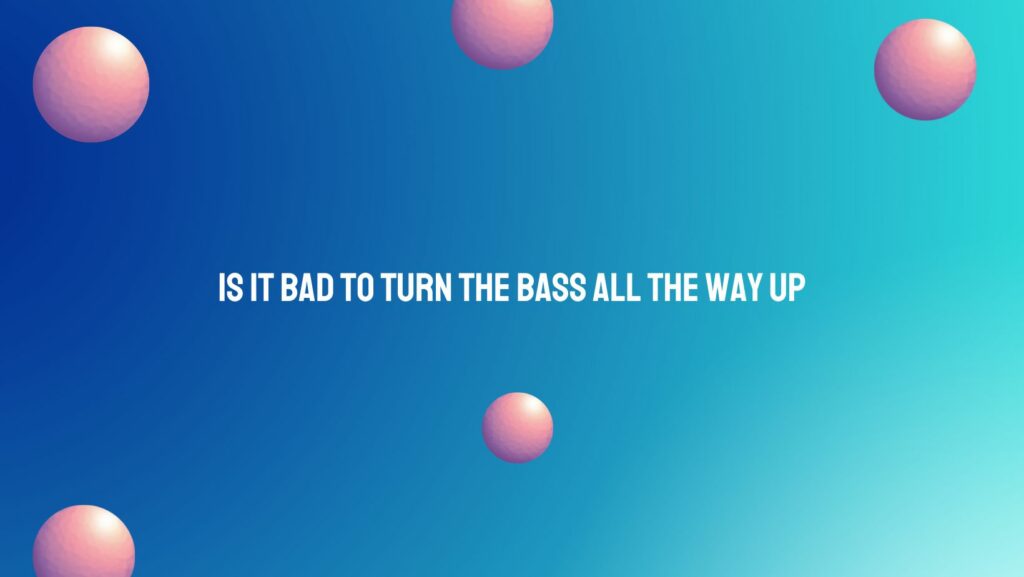When it comes to enjoying music, we all have our own preferences. Some of us like to feel the deep thump of bass reverberating through our bodies, while others prefer a more balanced audio experience. The question of whether it’s bad to turn the bass all the way up is a common one, and it’s a topic that has sparked many debates among audiophiles and casual music listeners alike. In this article, we’ll explore the potential consequences of cranking the bass to the max and provide insights into finding the right balance for your listening pleasure.
Understanding the Bass Control
Before we dive into the discussion of whether turning up the bass is harmful, it’s essential to understand how the bass control on your audio equipment works. The bass control, often found on amplifiers, receivers, and even on mobile devices, allows you to adjust the strength of the low-frequency sounds (bass) in your audio output. It typically covers the frequency range below 200 Hz, where the deepest bass frequencies reside.
The Pros and Cons of Maxing Out the Bass
Pros:
- Intense Bass Sensation: Turning the bass all the way up can provide an intense, visceral bass sensation that can be enjoyable, especially when listening to bass-heavy music genres like hip-hop, electronic, or dubstep.
- Customization: The ability to adjust bass levels allows you to customize your listening experience to match your mood or the type of music you’re enjoying. Some tracks benefit from a boost in the bass, while others require a more balanced sound.
Cons:
- Sound Quality: Maxing out the bass can significantly affect the overall sound quality. Excessive bass can overpower other frequencies, causing the music to sound muddled and unbalanced.
- Distortion: When you turn the bass all the way up, you risk introducing distortion into the audio signal. This distortion can manifest as rattling or vibrating sounds and, in extreme cases, can damage your speakers.
- Speaker Damage: Overloading your speakers with excessive bass can lead to physical damage over time. Prolonged exposure to bass levels that are too high can cause voice coils to overheat or even dislodge, leading to a costly repair or replacement.
- Power Consumption: Boosting the bass requires more power from your audio equipment, which can lead to increased energy consumption. This can be a concern for portable devices with limited battery life.
Finding the Right Balance
The key to a satisfying listening experience is balance. While it’s tempting to crank up the bass for that extra oomph, it’s essential to strike a balance that allows you to enjoy the music without compromising sound quality or risking damage to your equipment. Here are some tips for finding the right balance:
- Use Equalization (EQ): Instead of maxing out the bass control, use an equalizer to fine-tune your audio settings. Adjust the bass frequencies to your liking without overwhelming the rest of the audio spectrum.
- Match Bass to the Music: Different music genres benefit from varying levels of bass. Adjust the bass settings according to the type of music you’re listening to. For acoustic or classical music, less bass is usually ideal, while electronic or hip-hop may require more.
- Mind Speaker Specifications: If you have high-quality speakers or headphones, they can handle more bass without distortion. Cheaper or smaller speakers may struggle with excessive bass levels.
- Avoid Overexcursion: Be mindful of speaker excursion. If you notice your speakers moving excessively or making unusual sounds, you’ve likely gone too far with the bass settings.
In Conclusion
Is it bad to turn the bass all the way up? The answer is nuanced. While it can provide an intense bass experience, doing so often leads to poor sound quality, distortion, potential speaker damage, and increased power consumption. To fully enjoy your music while preserving sound quality, it’s best to strike a balance by using an equalizer or adjusting bass settings according to your music genre and equipment specifications. Finding the right balance will ensure that you can experience the power of bass without compromising your audio equipment or your listening pleasure.


